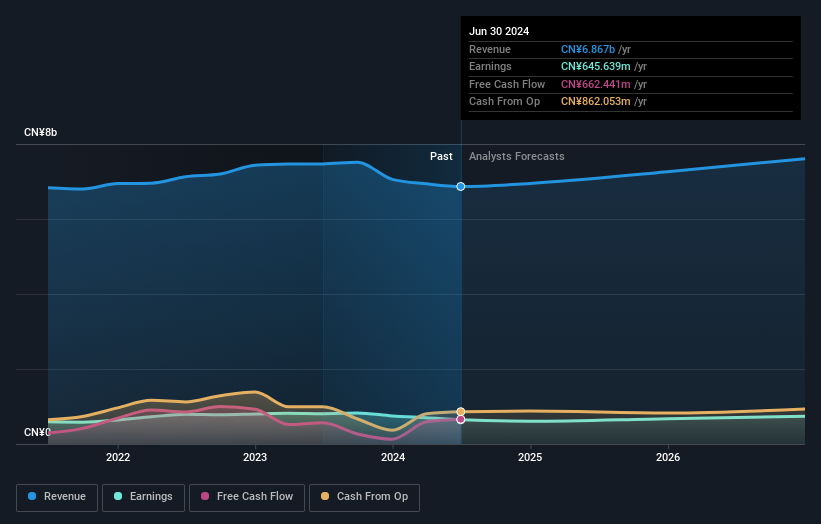The recent CN¥642m market cap decrease is likely to have disappointed insiders invested in Sanquan Food Co., Ltd. (SZSE:002216)
Key Insights
- Significant insider control over Sanquan Food implies vested interests in company growth
- A total of 4 investors have a majority stake in the company with 56% ownership
- Using data from analyst forecasts alongside ownership research, one can better assess the future performance of a company
A look at the shareholders of Sanquan Food Co., Ltd. (SZSE:002216) can tell us which group is most powerful. We can see that individual insiders own the lion's share in the company with 38% ownership. In other words, the group stands to gain the most (or lose the most) from their investment into the company.
And last week, insiders endured the biggest losses as the stock fell by 6.3%.
Let's take a closer look to see what the different types of shareholders can tell us about Sanquan Food.
Check out our latest analysis for Sanquan Food

What Does The Institutional Ownership Tell Us About Sanquan Food?
Institutional investors commonly compare their own returns to the returns of a commonly followed index. So they generally do consider buying larger companies that are included in the relevant benchmark index.
Sanquan Food already has institutions on the share registry. Indeed, they own a respectable stake in the company. This can indicate that the company has a certain degree of credibility in the investment community. However, it is best to be wary of relying on the supposed validation that comes with institutional investors. They too, get it wrong sometimes. If multiple institutions change their view on a stock at the same time, you could see the share price drop fast. It's therefore worth looking at Sanquan Food's earnings history below. Of course, the future is what really matters.

Sanquan Food is not owned by hedge funds. Super Smart Holdings Limited is currently the company's largest shareholder with 27% of shares outstanding. The second and third largest shareholders are Nan Chen and Xi Chen, with an equal amount of shares to their name at 10.0%. Xi Chen, who is the third-largest shareholder, also happens to hold the title of Member of the Board of Directors.
To make our study more interesting, we found that the top 4 shareholders control more than half of the company which implies that this group has considerable sway over the company's decision-making.
While studying institutional ownership for a company can add value to your research, it is also a good practice to research analyst recommendations to get a deeper understand of a stock's expected performance. There are a reasonable number of analysts covering the stock, so it might be useful to find out their aggregate view on the future.
Insider Ownership Of Sanquan Food
The definition of an insider can differ slightly between different countries, but members of the board of directors always count. Company management run the business, but the CEO will answer to the board, even if he or she is a member of it.
I generally consider insider ownership to be a good thing. However, on some occasions it makes it more difficult for other shareholders to hold the board accountable for decisions.
It seems insiders own a significant proportion of Sanquan Food Co., Ltd.. It is very interesting to see that insiders have a meaningful CN¥3.6b stake in this CN¥9.5b business. Most would be pleased to see the board is investing alongside them. You may wish to access this free chart showing recent trading by insiders.
General Public Ownership
The general public-- including retail investors -- own 30% stake in the company, and hence can't easily be ignored. This size of ownership, while considerable, may not be enough to change company policy if the decision is not in sync with other large shareholders.
Private Company Ownership
Our data indicates that Private Companies hold 27%, of the company's shares. It's hard to draw any conclusions from this fact alone, so its worth looking into who owns those private companies. Sometimes insiders or other related parties have an interest in shares in a public company through a separate private company.
Next Steps:
It's always worth thinking about the different groups who own shares in a company. But to understand Sanquan Food better, we need to consider many other factors. Take risks for example - Sanquan Food has 1 warning sign we think you should be aware of.
If you would prefer discover what analysts are predicting in terms of future growth, do not miss this free report on analyst forecasts.
NB: Figures in this article are calculated using data from the last twelve months, which refer to the 12-month period ending on the last date of the month the financial statement is dated. This may not be consistent with full year annual report figures.
Have feedback on this article? Concerned about the content? Get in touch with us directly. Alternatively, email editorial-team (at) simplywallst.com.
This article by Simply Wall St is general in nature. We provide commentary based on historical data and analyst forecasts only using an unbiased methodology and our articles are not intended to be financial advice. It does not constitute a recommendation to buy or sell any stock, and does not take account of your objectives, or your financial situation. We aim to bring you long-term focused analysis driven by fundamental data. Note that our analysis may not factor in the latest price-sensitive company announcements or qualitative material. Simply Wall St has no position in any stocks mentioned.
 Index Options
Index Options CME Group
CME Group Nasdaq
Nasdaq Cboe
Cboe TradingView
TradingView Wall Street Journal
Wall Street Journal